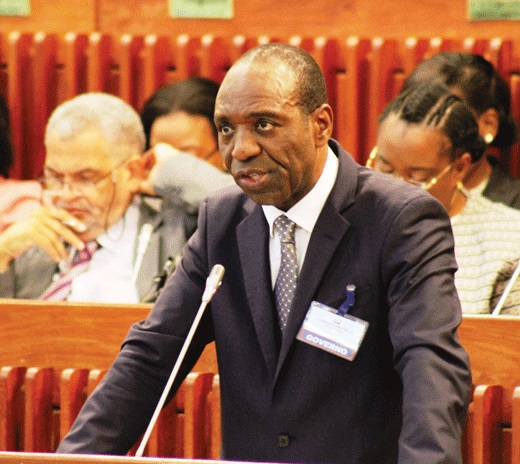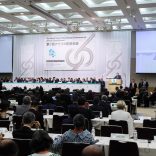Mozambique - Portugal Summit scheduled for 8, 9 December
No default, but government will not prioritise debt service

Notícias / Prime minister Agostinho do Rosario addressing parliament on June 8 2016
The Mozambican government has decided against defaulting on the debts contracted by the state or quasi-state companies EMATUM (Mozambique Tuna Company) Proindicus and MAM (Mozambique Assets Management), but it will not prioritise repaying these government guaranteed loans, Prime Minister Carlos Agostinho do Rosario told the country’s parliament, the Assembly of the Republic, on Wednesday.
Addressing an extraordinary sitting of the Assembly called to discuss the public debt crisis, Rosario admitted that a “can’t pay, won’t pay” scenario was enticing.
“Although not recognizing the debts contracted, by alleging that the contracts signed are null and void, is an attractive and simple option, it would have very negative consequences for the economy and for the good image of the country in the eyes of international creditors”, he said.
But he insisted that the government cannot prioritise repaying the debts, particularly those of Proindicus and MAM, at the expense of funding the priority projects contained in the government’s five year programme. To fund debt servicing rather than agriculture, education, health and water supply “would not be in line with the undertakings given to the Mozambican public”.
“We have domestic responsibilities to make operational the pledges contained in the government programme, and these cannot be forgotten because of the responsibility to pay the Proindicus and MAM debts”, the Prime Minister added. “The government is working to find a balance between honouring the undertakings given with debts applied in the public interest, and financing the priorities of social and economic development”.
The three controversial government-guaranteed loans were all contracted in 2013-2014 under the previous government, headed by President Armando Guebuza. At the time only the loan of 850 million US dollars to EMATUM, arranged via the European bond market, was public knowledge.
The 622 million dollar loan to Proindicus (a company intended to provide maritime security services) and the 535 million dollars for MAM (intended largely for maritime repairs and maintenance) were hidden, both from the Mozambican public and from the country’s international partners, including the International Monetary Fund (IMF).
When the undeclared loans became known in April, the IMF suspended the second part of a 282 million dollar loan under its Standby Credit Facility, and the 14 donors and funding agencies who provide direct support to the Mozambican state budget suspended further disbursements.
Rosario made clear that many members of the incoming government which took office in January 2015 were also unaware of the Proindicus and MAM loans. “With the beginning of a new cycle of governance in 2015, the government gradually became aware of the dossiers on the Proindicus and MAM debts, at the same time as it restructured the known debt of EMATUM”.
Unlike his press conference in April, Rosario did not use the excuse of “national security” as a justification for hiding the debts from public knowledge. Instead he admitted that the government had been wrong to keep the matter secret.
“We recognize that the information on the sovereign guarantees issued by the State in favour of Proindicus and MAM should have been shared in good time with you (the parliamentary deputies), with the Mozambican people, and with our international cooperation partners”, he said.
Leaving Proindicus and MAM off the official statistics on the public debt was “an omission which has implications for the assessment and correct analysis of the macro-economic situation of the country”, he added.
The problem now, Rosario stressed, was “to concentrate on seeking solutions so that our country regains, as quickly as possible, prestige and credibility in the international arena”. All Mozambicans, regardless of their political party affiliation “are called upon to make our contribution towards redeeming our country’s credibility”.
Rosario argued that the prime responsibility for repaying the debts lay with the companies that had contracted them. “They have the responsibility to accept the debts and pay them, without burdening the state budget”, he insisted. “The government restates its commitment to make the companies take their responsibilities”.
The government guarantees, he said, only covered those parts of the debts that were for purposes in the public interest. Work was thus under way to break down the Proindicus and MAM debts “into what has been used for the public interest and what was for commercial purposes”.
State companies, including Proindicus and MAM, had “to adjust their business plans to the current reality”, said Rosario. They must also “identify and establish partnerships that bring added technical value, and assess the possibility of selling some of their assets”.
Rosario put the total public debt, as of the end of 2015, at 11.6 billion US dollars. Of this sum, 9.89 billion dollars is the foreign debt, and 1.75 billion is domestic debt. The guarantees for EMATUM, Proindicus and MAM account for 1.81 billion dollars of the foreign debt (this figure is less than the sum of the three loans – slightly more than two billion dollars – presumably because of the EMATUM payments made in 2015).
The Prime Minister said that 60 per cent of the public debt was spent on infrastructure (roads, bridges, electricity, water supply and transport), 17 per cent want on agriculture and education, while the rest was for “other sectors”.












Leave a Reply
Be the First to Comment!
You must be logged in to post a comment.
You must be logged in to post a comment.